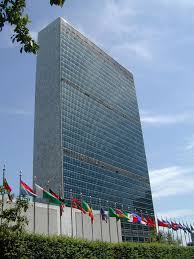NOTE: This post was written by Malissa Eaddy and Gahoussou Toure.
Malissa Eaddy is a Dual Degree MA student in the School of Diplomacy and International Relations and Asian Studies Programs. Her research interests include Japanese and Chinese language and cultural studies, Southeast Asian Cultural Studies and Post-Conflict Negotiations.
Gahoussou Toure is a joint MA/MBA student with the School of Diplomacy and International Relations and the Stillman School of Business. He holds Master’s and Bachelor’s Degrees from the University of Cocody in Cote d’Ivoire.
Graduate students from Seton Hall’s School of Diplomacy & International Relations have completed a landmark study of US public attitudes toward the United Nations based on a survey of 800 randomly-selected registered voters conducted by the Better World Campaign in October 2014.
Led by Dr. Martin Edwards, Associate Professor and Director of the Center for UN and Global Governance Studies, team members used two different methodologies to study factors that affect survey respondent perceptions of the favorability of the UN.
Team members first conducted a series of bivariate statistical tests to correlate demographic factors with the respondent’s view of the favorability of the UN. In a sub-sample of the survey, respondents were asked to explain why they had a favorable or unfavorable view of the UN. In a second phase of the project, these 181 verbatim respondents were analyzed to better understand the rationales behind respondent attitudes toward the UN.
The statistical analysis found evidence of gaps in gender, age, and ethnicity. Women had more positive opinions of the UN than men; younger respondents had more positive views of the UN than older respondents; and African-Americans and Latinos were more likely to have positive views of the UN than White respondents. Also as expected, there was strong evidence of a partisan and ideological divide in attitudes toward the UN. Respondents who identified as Conservative or Republican were more likely to view the UN unfavorably than those who identified as Liberal or as a Democrat. No differences in UN approval were found between respondents with different levels of education or different levels of income.
The qualitative phase of the project analyzed the responses to a follow-up question asking respondents why they gave the UN the favorability ratings that they did. This analysis found that support for the UN is rather diffuse. Those respondents with favorable views of the UN tended to focus more its value as a forum rather than on its value for the US. In contrast, objections to the UN focus on specific ways in which engagement with the UN is harmful for the US. Issues of bias, cost, and effectiveness were consistent rationales offered by respondents with unfavorable views of the UN.
These findings bring with them a number of implications for how we can shore up support for the United Nations. Both elements of the project are available for download at the links below:
Who Supports the UN? A Quantitative Analysis
Who Supports the UN? A Qualitative Analysis
For more information on the project, please contact Professor Martin Edwards at martin.edwards@shu.edu.
